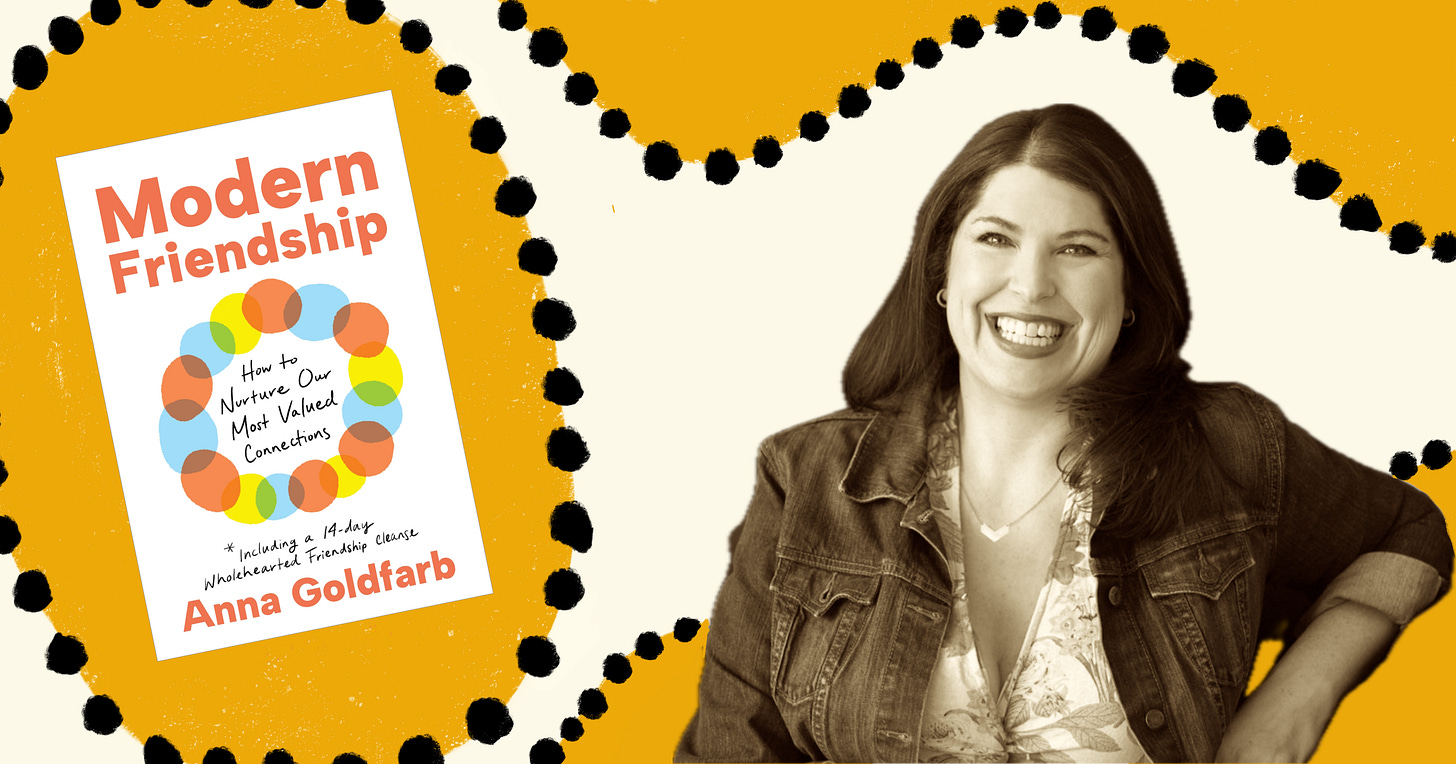Modern Friendship: Girl, it’s so confusing sometimes to be a friend
Memories, marriage troubles, and flexible mindsets.
You might notice some new posts around here, including this book feature and our live chat last week! We are playing around with videos, events, and other fun things for our community of friends. Reply to this email if you have any thoughts on things you’d like to see from us! 💛
The modern age is a tricky time to be a friend. Our lives have never been more scattered, our attention has never been more in demand, and the ever-present hum of consumerism is always there, urging us to seek out more! new! better! things. We simultaneously feel pressured to always be available via our cellphones, while rarely having time or bandwidth to actually connect. It’s no wonder our friendships are struggling to grow and survive. We are trapped in a paradox, an impossible bind….But can we escape it?
That is the tangled question journalist and friendship expert
tackles in her book Modern Friendship: How to Nurture Our Most Valued Connections.Through revealing personal stories, interviews, and well-explained data points, she works bit by bit to loosen the knot many of us have tied ourselves into. The book is divided into three parts, each of which approaches the topic from a slightly different angle: Who Matters to Us, Mattering to Others, and Practicing Wholehearted Friendship. You might be wondering, what’s wholehearted friendship? Anna gives a simple definition: a friendship that we show up to with desire, diligence, and delight. After many chapters of quick and easy reflection prompts that hone these key points, the book wraps up with a 14 Day Friendship Cleanse to help reset your mental framework about friendships.
When I first picked up Modern Friendship, I was skeptical. I resented that the world we live in makes friendships hard, and I didn’t think that stewing in the misery of modernity for 200+ pages would help. Now, on the other side, I am a convert. Bit by bit, Anna led me along with little breadcrumbs of psychology and sociology research. Then, she crafted low-stakes, high-reward exercises to help me learn to implement what science shows works. While not all of the prompts resonated with me (I am still a little confused over the difference between bathtub and jacuzzi friends), the vast majority were thought provoking and action oriented. I finished the book feeling clearer and more empowered. Just like in a relationship, if you want to get the most out of this book, you have to show up and engage!
Why it’s in the Forevers library: Modern Friendship takes some of the guesswork out of making and keeping friends thanks to insightful research and reflection prompts.
This week you get TWO Forevers Focuses (foci?) — one from each of us — based on ideas that suck with us from the book!
Sam’s focus: Make a memory
Who reaches out to someone and says, “Let’s make a memory”? Most people throw, say, a birthday party to feel good in the moment, not to look back on that memory of the party at some mystery date in the future.
But then Dr. Langkamp’s advice clicked. All the texts in the world to a friend saying “Thinking of you!” and “Miss your face!” feel good, but they don’t feel nourishing. There’s nothing engaging our souls when reading a generic text like that.
Studies show that there is no substitute for the real deal of in-person hangout time. The spontaneity, the sense of discovery, the FUN.
— Modern Friendship, chapter 12
Dive into the FUN of a “first” with your friend. Make a list of five things you have never done and would like to try, have them do the same. Compare lists! If there is overlap, do that together! If there isn’t, don’t worry. Pick one thing from each other’s list that you would be willing to try, then go do them! Flip a coin to decide which to start with.
Some example memory making activities (from Modern Friendship and from yours truly):
Eat (or cook!) a cuisine that’s new to you both
Get a manicure or pedicure
Beat a video game or arcade game
Have a picnic in a park you haven’t been to before
Volunteer together
Randomly pick a country on the globe and watch a movie made there
Book surprise! Buy your friend a book and let them purchase a book for you (or get them from the library!)
Set a DIY goal together (e.g., Today we’re going to learn how to make dirty martinis. Or install a bidet [Erin has promised to help me do this next time she’s in town]. Or build a raised garden bed.)
Erin’s focus: Practice a flexible friendship mindset
Fixed expectations are rigid, narrow, and myopic. Success is black and white: you either achieve the objective or you don’t…
On the other hand, flexible expectations are open, curious, and dynamic. They are responsive to new information and adjust accordingly. They are aware of what forces are in their control and what forces aren’t. They work harder to find updated definitions of what success looks like and are proactive about protecting one’s headspace…
Updating your expectations will give both people in the friendship more freedom because it shows you’re open to growing together.
— Modern Friendship, chapter 13
Think back to a few recent expectations you’ve had of your closest friends. If you are having trouble, start by thinking about the last few times you’ve felt disappointed by them or your friendship. Then, consider what expectations you had of your friend that led you to feeling let town. Anna suggests the following prompts in the book:
Expectation: (What did you think would happen?)
Reality: (What actually happened?)
Emotional result: (How did it make you feel?)
My expectations were: (Flexible or rigid?)
Next time I want to: (How could you be more flexible in the future?)
I’m not suggesting you let your friends walk all over you (and neither is Anna!). I might add a question 4(b) where you consider whether this is an expectation that’s important to you for the friendship to work, or whether this is an area where you could give your friend some grace. If the former, you may need to have a tough but important conversation about boundaries and needs in the friendship. If the latter, think how you could change your vision of what this friendship looks like so you don’t feel let down in the future.
We need to talk about: Romantic relationships as friendship-killers
Multiple times throughout the book, the topic of friendships being ended or deprioritized due to romantic relationships is raised. Over and over, research and personal stories showed that friendships were second fiddle to so-called significant others. Perhaps unsurprisingly, these conversations often relate to gender roles, dynamics, and expectations. Here are a few excerpts to get the conversation flowing.
A quote from a section about getting friends to say yes to hangouts:
When you’re in a committed relationship, giving your friend a clear, compelling reason to get together makes it easier for them to prioritize your hangout by organizing childcare, negotiating with their partner, or rearranging their commitments and obligations. This way your friend can make the case that spending time with you is important.
A quote from an interviewee, describing his friend’s reaction to a request for more effort:
I don’t want to put effort into our friendships because I have to put effort into my family. And I have to make an effort at work, with my wife, and my in-laws. When I hang out with you guys, I want to put in zero effort.
A quote from Dr. Geoff Greif, professor at the University of Maryland School of Social Work and author of Buddy System: Understanding Male Friendships:
If I’m going to drop somebody and I don’t have a lot of time, I’m going to drop the person that could potentially be most troublesome to my marriage…that’s going to be a [friendship with a] woman, perhaps.
Both Erin and I had strong reactions to the idea that we would need to “make the case” that spending time with each other is important. Even more absurd to us was the suggestion that our friendship might be a threat to our romantic partners. As a queer woman attracted to all genders, I am just as likely to be attracted to Erin as any dude. Does that mean my husband should mistrust my relationship with her?
What we’ve found is that our partners respect and support our friendship, with a clear understanding that there will be no begging for permission1. We make time for one another, period. For us, it is all about balance, rather than some sort of competition. And, in my experience, my close friendships make me a better romantic partner! Still, we know our example is only one small sliver of friendship pie.
So, let’s talk. Do you find it challenging to prioritize both your friendships and your romantic relationships? How does the answer to this change depending on the gender identities of the people involved? Do you feel like your romantic partners understand and support you making time for your friendships? Or is it more of a tug of war? Have you lost any friends because of a new romantic relationship or marriage? Tell us in the comments!!!
Forevers is a project to celebrate and deepen forever friendships. Our art and writing is 100% handcrafted by two best friends to help you and your friends stay connected. Will you be our friend?
Erin note: In fact, one of the things I loved about my partner early on is how much he loved my friends, how he explicitly commented how I surround myself with great people, and how he has always supported me carving out time for them.




